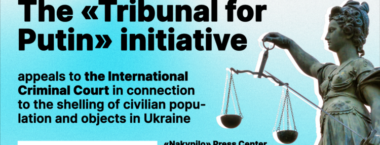While the use of torture by law enforcement officials in areas not directly affected by the military conflict appears to have decreased, the scale of abuse and major rights violations in Russian-occupied Crimea and in the Donetsk and Luhansk oblasts has increased alarmingly since the military conflict began in 2014.
There are complaints of torture by Ukrainian soldiers or the Security Service [SBU], as well as by the Russian and pro-Russian militants. The fact that so few agents of the state are held to answer, even where the use of force results in somebody’s death, will be one of the challenges that 12 human rights groups have united to address.

On Jan 16, the Ukrainian Helsinki Human Rights Union and Kharkiv Human Rights Group announced the formation of a Coalition against Torture aimed at preventing the still prevalent use of torture or ill-treatment in places of imprisonment. 12 rights groups from around the country will take part in visiting places of confinement and other activities. The focus is very much on active prevention and help rather than simply monitoring and reporting on conditions in prisons, etc.
The good news is that after years of sociological surveys reporting a devastatingly high public assessment of the prevalence of police torture, the results in 2015 showed a significant drop. While in 2011, the estimated number of victims of unlawful violence by police was just short of a million, with 409 thousand considered victims of torture, the corresponding numbers for 2015 were 113,331 and 62,935. The study has always been based on public perception, rather than hard evidence, however there is a clear movement in the right direction. Good news can, of course, only be understood loosely when there could be as many as 63 thousand victims of torture or ill-treatment.
One systematic problem is the failure in many SIZO [remand units] or prisons to react when prisoners urgently require medical treatment or when their state of health means that their continued imprisonment is effectively signing their death warrant. In such cases intervention is needed immediately.
There is also serious concern over cases where people face being forcibly sent back to countries where their life could be in danger. The SBU has played a very strange role here.
In September 2016, for example, the SBU effectively abducted Amina Babaeva, a 26-year-old woman who had just applied for asylum in Kharkiv and forcibly handed her over to Russia. The same baffling level of collaboration with Russia’s FSB has been seen in SBU attempts to force 32-year-old Ruslan Meyriev, who has a Ukrainian wife and children, to agree to be deported to Russia where he is facing obviously dubious charges. It is likely that in Meyriev’s case, as well as some others, the SBU has influenced Ukraine’s Migration Service into refusing applications for asylum. It is human rights organizations who have thus far foiled such attempts, mainly by turning to the European Court of Human Rights to intervene.
The work of the Coalition must inevitably be coloured by the military conflict in Donbas and ongoing occupation and mounting repression in Crimea. The scale of the violations in eastern Ukraine and Russian-occupied Crimea, including summary executions and forced disappearances, has increased since 2014, with a level of brutalization and acceptance of violence. In general, the Coalition believe that there must be a policy of zero tolerance for any form of torture, but there is a particular need to address both the brutality and impunity for there to be any hope of future reintegration of areas now under occupation.




